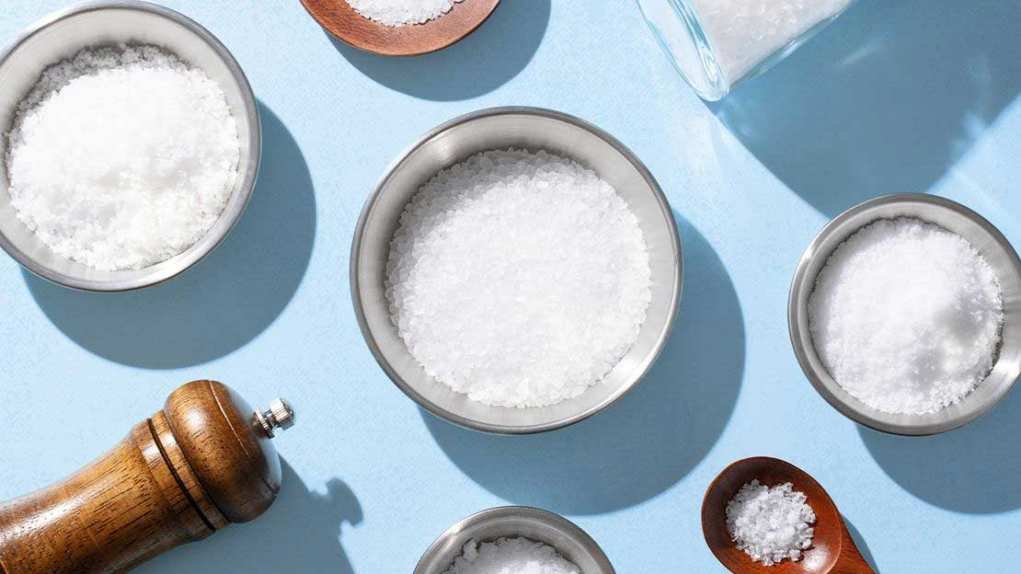
A recent study found that eating lots of fruits and vegetables may help reduce the risk of premature death in habitual salt users.
People who never miss an opportunity to add extra salt to their meals may not live as long as those who rarely reach for the saltshaker. At the age of 50, always adding salt to your meals could reduce life expectancy by 2.28 years for men and 1.5 years for women, compared with those who don’t add extra salt, according a study published in the European Heart Journal on July 10.
“To my knowledge, our study is the first to assess the relation between adding salt to foods and premature death,” lead author Lu Qi, MD, PhD, HCA Regents Distinguished Chair and professor at Tulane University School of Public Health and Tropical Medicine in New Orleans, said in a release.
These findings present new evidence to support recommendations to modify eating behaviors to improve health, said Dr. Qi. “Even a modest reduction in sodium intake, by adding less or no salt to food at the table, is likely to result in substantial health benefits, especially when it is achieved in the general population,” he said.
Most Americans Consume Nearly 50 Percent More Than the Recommended Daily Amount of Sodium
Interesting, adding salt to food isn’t the main way that Americans consume sodium; it only accounts for about 6 to 20 percent of our daily intake. The majority (around 70 percent) of dietary sodium comes from packaged and prepared foods such as deli meat, pizza, tacos, and chips, according to the U.S. Food and Drug Administration.
In spite of that, how often a person salts their food is a good indicator of overall sodium intake, according to the authors. “Adding salt to foods at the table is a common eating behavior that is directly related to an individual’s long-term preference for salty-tasting foods and habitual salt intake,” said Qi. Using data on adding salt at the table provides a unique way to evaluate the association between habitual sodium intake and the risk of early death in people eating a Western diet, he noted.
Although sodium is essential for overall health, too much of it is associated with developing high blood pressure. The average American consumes about 3,400 milligrams (mg) of sodium per day — nearly 50 percent more than the recommended amount of 2,300 mg per day.
Study Looked at the Impact of Added Salt in More Than Half a Million People
To examine the association between the frequency of adding salt to food and the risk of premature mortality and life expectancy, researchers used 501,379 participants who had enrolled in the UK Biobank and completed a dietary questionnaire that included information about salt intake.
The UK Biobank is an international health resource that collected blood, urine, and saliva samples, along with detailed health information, from more than half a million people throughout England, Wales, and Scotland between 2006 and 2010 — in order to aid research on a wide range of illnesses.
Investigators adjusted for factors that could impact mortality, including age, sex, race, body mass index, smoking status, alcohol intake, physical activity, diet, and medical conditions such as diabetes, cancer, and heart and blood vessel diseases. Participants were followed for an average of nine years, and premature death was defined as dying before age 75.
People Who Always Added Salt Had a 28 Percent Higher Risk of Dying Before Age 75
Researchers found that in addition to lower life expectancy, the “always salt” group had a 28 percent increased risk of dying prematurely. According to the authors, in the normal population, about 3 out of 100 people die between age 40 and 69, and the increased risk seen in the “always salt” group suggests that one additional person out of 100 may die early.
There are many studies indicating that too much sodium can have a negative effect on overall health and that reducing sodium can have long-term benefits. In a study published in The New England Journal of Medicine in 2021, researchers found that using a salt substitute rather than salt in household cooking and seasoning was associated with a reduced risk of stroke, heart attack, and death.
Why does sodium matter so much? It really comes down to blood pressure, says Jim Liu, MD, a cardiologist and assistant professor in the division of cardiovascular medicine at The Ohio State University Wexner Medical Center in Columbus. Dr. Liu was not involved in the study.
“Hypertension is one of the main risk factors for stroke and heart disease. If blood pressure is uncontrolled and remains high, the risk of stroke and heart disease will be elevated; a low-sodium diet can help reduce blood pressure,” he says.
Eating Lots of Fruits and Vegetables May Help Mitigate the Effects of Added Salt
On a positive note, investigators found that the risk went down slightly among people who ate higher amounts of fruits and vegetables, though the results were not statistically significant.
“We were not surprised by this finding as fruits and vegetables are major sources of potassium, which has protective effects and is associated with a lower risk of premature death,” Qi said.
That’s because potassium helps relieve tension in the blood vessel walls, which can also lower blood pressure, according to the American Heart Association.
The most natural way to for people to consume more potassium and less sodium is by eating natural sources of potassium, including produce such as citrus fruits, bananas, tomatoes, spinach, and broccoli.
More Research Is Needed Before Making Recommendations
Because this study is the first to report a relationship between adding salt to foods and mortality, further studies are needed to validate the findings before making recommendations, said Qi.
Although the size of the study was quite large, the authors did note a few limitations that should be considered when evaluating the findings. Because the UK Biobank is voluntary — not random — it’s not necessarily representative of the general population. It’s also possible that adding salt to foods is a marker of an unhealthy lifestyle in general or a lower socioeconomic status, though researchers tried to control for those factors.
Although the participants reported how often they salted their food, the study didn’t capture how much salt was being added, and finally, adding salt might be related to how much food the people were consuming, which could also impact the findings.
Important Notice: This article was published at www.everydayhealth.com by Becky Upham where all credits are due.
Disclaimer
The watching, interacting, and participation of any kind with anything on this page does not constitute or initiate a doctor-patient relationship with Dr. Farrah™. None of the statements here have been evaluated by the Food and Drug Administration (FDA). The products of Dr. Farrah™ are not intended to diagnose, treat, cure, or prevent any disease. The information being provided should only be considered for education and entertainment purposes only. If you feel that anything you see or hear may be of value to you on this page or on any other medium of any kind associated with, showing, or quoting anything relating to Dr. Farrah™ in any way at any time, you are encouraged to and agree to consult with a licensed healthcare professional in your area to discuss it. If you feel that you’re having a healthcare emergency, seek medical attention immediately. The views expressed here are simply either the views and opinions of Dr. Farrah™ or others appearing and are protected under the first amendment.
Dr. Farrah™ is a highly experienced Licensed Medical Doctor certified in evidence-based clinical nutrition, not some enthusiast, formulator, or medium promoting the wild and unrestrained use of nutrition products for health issues without clinical experience and scientific evidence of therapeutic benefit. Dr. Farrah™ has personally and keenly studied everything she recommends, and more importantly, she’s closely observed the reactions and results in a clinical setting countless times over the course of her career involving the treatment of over 150,000 patients.
Dr. Farrah™ promotes evidence-based natural approaches to health, which means integrating her individual scientific and clinical expertise with the best available external clinical evidence from systematic research. By individual clinical expertise, I refer to the proficiency and judgment that individual clinicians acquire through clinical experience and clinical practice.
Dr. Farrah™ does not make any representation or warranties with respect to the accuracy, applicability, fitness, or completeness of any multimedia content provided. Dr. Farrah™ does not warrant the performance, effectiveness, or applicability of any sites listed, linked, or referenced to, in, or by any multimedia content.
To be clear, the multimedia content is not intended to be a substitute for professional medical advice, diagnosis, or treatment. Always seek the advice of your physician or other qualified health providers with any questions you may have regarding a medical condition. Never disregard professional medical advice or delay in seeking it because of something you have read or seen in any website, video, image, or media of any kind. Dr. Farrah™ hereby disclaims any and all liability to any party for any direct, indirect, implied, punitive, special, incidental, or other consequential damages arising directly or indirectly from any use of the content, which is provided as is, and without warranties.








